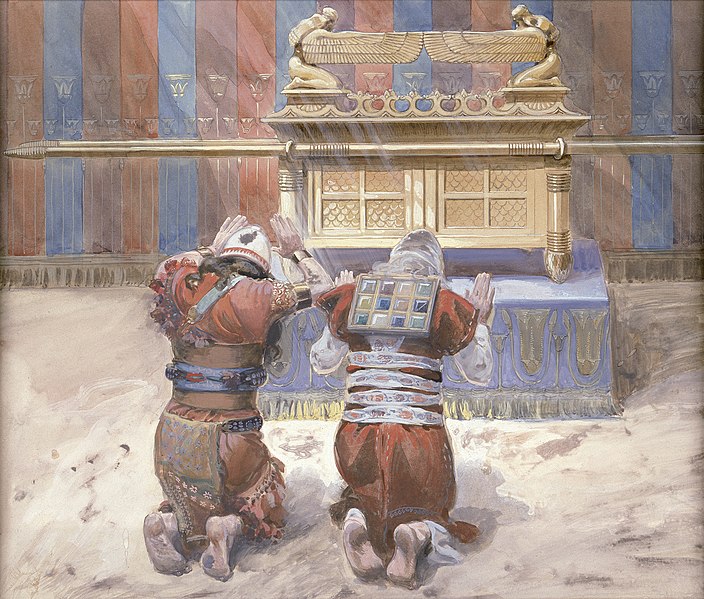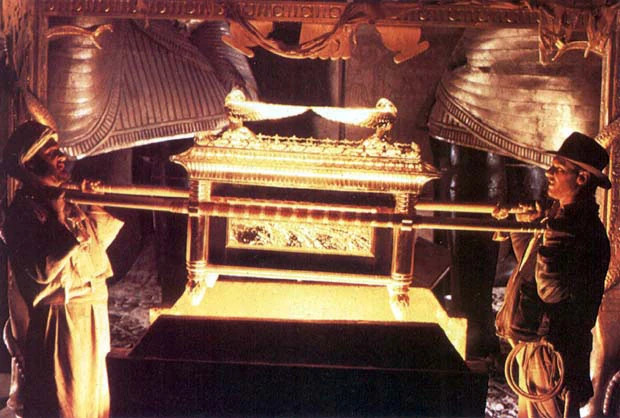Remembering Uzzah
Have you heard the story of Uzzah? He was a follower of God who was struck down by God for daring to try and protect God’s special box. And today his story provides a troubling example of believers desperately trying to find someone, anyone to blame so they don’t have to blame God.
So I wanted to remember him - without excusing God.
The story
You can find the full story in 2 Samuel 6, but here’s the rough story as I would have heard it in Sunday School:
King David wanted the Ark of the Covenant brought to Jerusalem, his new capital. It was a special occasion, so there was music and dancing and celebration. However, they made a little mistake: They put the ark on an ox-drawn cart. It may have been a new cart, specially made for the occasion, but it was still, well, a cart.
Everything seemed to be going OK till they reached the threshing floor of Nakon, then tragedy struck. The oxen drawing the cart stumbled. Presumably, the ark looked like falling off, so Uzzah grabbed it. God got angry that Uzzah had dared to touch the ark (“his irreverent act”), and so he killed him.
David was first angry, then scared, so he gave up on taking the ark to Jerusalem. It was left with a local family to take care of.
Fortunately, though, there’s a happy ending to this tale. God blessed the family where it was being kept. When David heard this, he decided the time was right for a second attempt. There were more sacrifices, more rejoicing, more celebration. There was also one crucial difference: This time, the ark was being carried by humans rather than on an ox cart.
The change worked: The ark made it to Jerusalem. Mission accomplished.
It’s not clear whether anyone on the second expedition took the time to visit Uzzah’s grave. It’s not even clear whether he had a marked grave (though the place was named Perez-uzzah after him, so I guess that’s something).
By that point, though, he was an irrelevant footnote in a far greater story. The Sunday School lesson has already moved on to the ark arriving in Jerusalem. Next week we would hear about David’s plan to build a temple to house the Ark in (leading to Solomon’s Temple), and about God’s promises to David and how they point forward to Jesus, Saviour of the World. What does the life of one man matter against that mighty back-drop?
A note on historicity
Given I’ve started with my Sunday School experiences and a story from the Bible, an obvious question is: Did this actually happen? The starting point in Sunday School was that the Bible was literally the Word of God, and that the historical sections were completely accurate records of things that happened as described. My religious relatives approach their daily Bible readings the same way.
I don’t treat it this way. It’s possible that there was a man called Uzzah who died in a way that was somehow connected to the Ark of the Covenant. But if so, I suspect a lot has been lost or changed in transmission. I see no reason to believe that there was literally a vengeful God striking him down. And it wouldn’t surprise me if none of this happened.
I’m more interested in the implications the story has today for believers who do think it’s historical, and who do worship the God described in the story. And so I remember the Uzzah of the story, whether historical or not, because I don’t think he deserved the treatment he got.
What was the Ark of the Covenant?
I mentioned in my last post that I’d come across an Ark of the Covenant at the Ten Commandment Park in the wilds of Montana. Well, here it is:

Just imagine that’s Mount Sinai in the background, not Glacier National Park, and that the traffic and the Jesus signs are gone. . However, it’s missing something: a lid with a pair of cherubs on it (don’t you dare call them “graven images”). Here’s an artist’s impression:

Or perhaps you know it better from Indiana Jones:

The ark was a wooden box plated with gold, but the lid itself and the cherubs on the lid were solid gold. It was Judaism’s most sacred object, a sign of the invisible god’s presence with his people. It wasn’t meant to be seen by anyone except the High Priest in a special yearly ceremony.
I assume that’s why David wanted it in his new capital city: Because having it would lend his administration God’s authority.
The wanderings of the Ark
The Ark had actually been wandering for a while. The story goes that many years earlier, Israel had decided to use the Ark as their secret weapon after defeat by the Philistines. They wanted God’s presence with them. However, they lost again the next day, and the ark was captured by the Philistines.
God then sent plagues on the Philistines until they returned it to the Israelites. The Israelites rejoiced and made offerings to God. Then the rejoicing was turned into mourning when God killed seventy of them for daring to look inside the ark.
They had to find somewhere safe to put it, so they sent it to Kiriath Jearim, and it was kept in the house of Abinadab. It stayed there for many years, till David came to collect it. This is relevant because Uzzah was actually the son of Abinadab - he’d probably been serving the Ark all his life.
This tale shows that God had a history of killing people who associated with the ark, whether they were “his people” or “the enemy”. But what was wrong with what Uzzah did? And why exactly did it deserve death?
What was the problem?
Remember when I first told the story I emphasised that first time round, they used a cart, then the second time round people carried it? Well, that’s because in the Law of Moses it said the ark should be carried. If they’d just obeyed the clear instruction, Uzzah wouldn’t have died, so it was all their fault (for the record, this is known as “victim blaming”).
I remember this explanation from Sunday School days, but it turns out that it’s actually been around for a long time: In the Chronicles version of this story, the author puts this explanation into David’s mouth as the reason why God was angry with them.
Let’s tell the story a bit differently
Since I’m not happy with the Sunday School, it’s-definitely-not-God’s-fault version of the story, here’s how I might tell it, drawing on my own experience growing up religious:
From his very earliest years, Uzzah had heard how powerful Yahweh was, and how lucky Israel were to have Yahweh to protect and care for and bless them. In that, he was like many young Israelites. However, he also knew that his family’s house was special, because it had the Ark of the Covenant, representing the very presence of his god. Yes, he knew Yahweh was everywhere, but he also liked to think of Yahweh watching him specifically.
It was a responsibility, caring for the Ark, but it was also a privilege to be able to serve his god and to see the Ark that most weren’t able to see. He always tried to do his best, and he must have been doing something right - after all, couldn’t he see so many signs of Yahweh’s blessings in his life?
And so, on that fateful morning, he was a little sad to be losing all that. It would be an end of the daily duties he loved, and an end of the constant reminders of Yahweh’s care for him. But he’d heard so often that Yahweh’s steadfast love endures for ever, and he knew he’d be able to find new ways to serve him. Life would go on: Tomorrow, next week, next month, next year. Yahweh’s goodness would continue.
Today was a special time for Israel, though: A new start with a young, enthusiastic, Godly king. Uzzah prayed a final prayer in front of the Ark, then resolved to join in the celebrations and to finish this chapter of his service to Yahweh on a high.
Obviously there’s a lot of poetic license in this version of the story. But it shows - as I believe - that the Uzzah of the story had every reason to be a religious man, and I think it heightens the record scratch moment that is clearly there in the text.
Here’s what I think are the clear facts: Uzzah wasn’t just a random stranger. He’d been in a position to be serving God and the Ark all his life. What’s more, trying to catch a falling Ark shows that he was still trying to serve his god the best he knew how. Only for that same god to strike him dead without any hesitation or compunction.
This is shocking. Or at least, it should be shocking.
I think any serious believer should ask themself “Could that be me?” (I suggest the answer is “Yes”). Then ask “How does that make me feel about serving God?”
Pushing back on the victim blaming narrative
This story came up in discussion with relatives a few weeks ago. I knew exactly what explanation would be given. And I also knew that I wasn’t going to let it pass by unchallenged - though I couldn’t tell you why I chose this specific example out of so many questionable stories to challenge.
Growing up, we were frequently told “Your response is your responsibility”. Yes, sibling/friend/whoever might be trying to bug you, and they might have done something that upset you, but that doesn’t force you to respond with anger or to try and hurt them.
That seemed a reasonable place to start, so I suggested that God had a choice: He didn’t need to strike Uzzah dead. But that’s not how it works, I was told.
God is unchanging, you see (and that’s supposed to be a good thing). The law was there, and the people of Israel should have known about it (I swear, sometimes it feels like they imagine people in Bible times had complete printed Bibles on hand, probably in English, ready for them to do their daily Bible study and discover God’s clear commands).
God wanted to work with his people, but it had to be done his way. God had to uphold his character. His people had the choice to obey or disobey that obscure provision in God’s law, but once they’d made the wrong choice, striking Uzzah dead was literally God’s only option.
Honestly, that lack of choice makes him sound a pretty weak god to me, but I’m an unbeliever - what would I know?
Then the discussion moved on to parenting. Children need clear boundaries, to be told “Here’s what will happen” and then have it happen. Anything else just leads them to uncertainty, which is even worse.
I mean, Uzzah’s death seemed to catch David and the rest of the people there by surprise, so perhaps it wasn’t that clear. And it’s hard to see an obvious connection between “using a cart rather than carrying the Ark” and “Someone must die”. But what would I know? I’m not a believer, and I’ve never been a parent, so how can I possibly have a moral opinion?
What God sounds like
When I imagine the scene, I think of John Cleese saying “It makes me mad”. Right before bringing a cleaver down:
Perhaps God should take Michael Palin’s words to heart: “Never kill a customer” (and that should probably extend to “never kill a worshipper”).
That hardly sounds like the One True God, the supreme arbiter of all morality. He’s supposed to be the mature, wise parental figure here. And yet he seems much more like a child having a tantrum and hitting out at the person who upset them.
I believe my relatives would be shocked if a human parent reacted to their child upsetting them by killing the child. And they certainly try to teach their children that hitting out at others who upset you is not OK. But apparently that sort of behaviour is completely OK - so long as it’s God who’s doing it.
I’ve been thinking what we might tell a child to do in this situation. Perhaps we’d tell them to use their words. When other kids try to touch their treasured possessions, say something like:
I know you meant well, but that box is rather special to me, and could you please not touch it again?
That might not be a good script. I’m not sure. But it’s a hell of a lot better than going all:
My name is Yahweh of Armies. You touched my special box. Prepare to die.
The God shaped hole in their morality
I think the morality I was brought up with has many good points when it comes to relating to people around me. Sure, I’ve changed things since leaving religion. But a lot of it was just a good, old-fashioned “Do no harm” morality: Care about the people around you, be kind to others and don’t hurt them, do unto others as you would have them do unto you, be reliable and honest. No argument from me there.
However, I now see two massive holes in that morality - and they’re both related to God and religion.
First, we needed to accept that God could break any of those rules, perhaps all of them, and it would remain completely OK. He would always be in the right. By definition.
Second, we needed to accept that humans could break any of those rules - so long as they thought they were following the Word of God.
This also meant we had to be prepared to defend both God’s actions and the arbitrary commands given in the Bible. The explanations for why Uzzah had to die are just one of many instances of believers circling the wagons around God.
Many Christians claim that because the Bible teaches humans are made in the image of God, Christianity upholds the dignity and worth of the individual in a way other moral systems can’t. There’s a lot to dispute in that claim. But it particularly infuriates me in this case, because I don’t see a lot of dignity for Uzzah. His life was irrelevant when placed beside God’s special box.
In dealing with our enemies, Jesus said that we were to be perfect as our heavenly Father (God) is perfect. And yet, this story shows the way God treated someone who wasn’t an enemy (while actual enemies, let’s not forget, might face God-ordered genocide). It’s not just that God isn’t perfect - he’s not even close. Not only isn’t he in the ball-park, but he moved to a different country without ball-parks, then declared he had the One True Ball Park.
I see no reason to believe this god exists - but if he did, he certainly wouldn’t be humanity’s friend, let alone an example to us. I hate the idea that he’s always in the right.
And part of what I hate about it is seeing people I care about give a pass to God that they wouldn’t give to humans. Had it been another human acting as God acted, I think they’d be lining up to say that it was wrong and that that human had other options. But no, God is unchanging and that’s just the way it is.
The danger of growing up with the Bible
I grew up with these stories. We had daily Bible readings, weekly Sunday School, and church services multiple times a week. They were just an ordinary part of life.
I now hear unbelievers criticising Christians for not reading the Bible they follow, and it reminds me that we made the same criticism of other Christians. That was one of the ways we could be confident that we had The Truth.
In my youth, I read a lot of Isaac Asimov - though, strangely, never the following quote - and I largely agree with him:

But the real kicker is that “properly read” part. I was familiar with the Bible. Very familiar. I still am, though I’m thankfully a bit rusty after years of freedom from my childhood religion.
It’s probable that we read the Bible more than most Christians. But that wasn’t all we were doing. As well as learning the text, we were also learning all the pat answers. All the ways to explain away anything uncomfortable in the text.
When I was making my way out of the religion, even though I didn’t believe God existed, I found it hard to accept places where unbelievers said God performed an atrocity. I’ve written before about the impact Ken Daniels’ Why I believed had. There were things I disagreed with. Places I thought he was too harsh on the Bible, or that there was a better explanation that didn’t make God or the Bible look so bad. But what I realised reading the book was that even if I discounted 50% of the arguments as exaggerated I couldn’t ignore the rest. And now, after years out of that environment, I expect if I read it again I would agree with far more of it.
My problem wasn’t a lack of reading the Bible, but lack of the ability to recognise what it was actually saying. And I think the same is true of the story of Uzzah. It’s no good reading the Bible regularly if you’re only able to see what you expect to see there, or if your discussion afterward focuses on the simplistic “explanations” that remove the need to worry about situations that should be troubling.
Coming to the story of Uzzah again as an unbeliever, I think it is a shocking story. I’m shocked by it - but I’m also shocked that former me wasn’t either shocked by it or disturbed by its implications. That I just accepted that it was Uzzah’s fault, or maybe David’s fault - anyone’s fault but God’s.
Stockholm Syndrome?
Sometimes, it seems to me a kind of Stockholm Syndrome. It’s just so frequent that relatives jump straight from justifying horrific actions of God to talking about God’s mercy or the eternal reward. Perhaps they talk about it with longing, or perhaps just in disbelief that others wouldn’t dot every ‘i’ and cross every ‘t’ to get that reward.
I’m not sure the connection is conscious, but I don’t think it’s accidental. They’re having to reconcile their image of a loving, caring God with stories of a God frequently meting out destruction on a large scale.
I may well think that the changeless, rule-driven God they presented didn’t sound very loving or capable of mercy. Or that Uzzah was at least as deserving of God’s mercy - well, if he even committed a sin - as any believer today.
But that doesn’t matter here. If God did prove unjust or arbitrary, their entire castle would come crashing down. Perhaps they believe that questioning God’s actions and getting upset about the death of Uzzah would lead to them sharing in his punishment. Perhaps they need to think God is good just to live with themselves. Or perhaps they’re just so used to it that they can’t imagine living life any other way.
I also feel like there’s a secondary purpose to all this: Reassuring themselves that it couldn’t happen to them. The more they can find fault with the people God struck down, and the more they can catch them in dread sins or lack of knowledge of God’s requirements, the more they’re able to say “See, that couldn’t happen to me”.
If this really is what’s at work (whether consciously or subconsciously), my view is clear: I think it should be scary that they’re putting all their trust in a God who is clearly capable of striking down a believer without a second’s hesitation.
In memoriam, requiescat in pace
If you choose to remember Uzzah, don’t remember him as a rebel or a sinner struck down by a righteous God. Remember him as someone who was a good servant of God, someone who was trying to serve God the best he knew how up to the very instant of his death. Then remember that God struck him dead with no hesitation and no compunction. And that humans from King David on have tried to justify that action.
Uzzah wasn’t the first Bible character to die at God’s hand, nor was he the last. But this just feels like it should be a clear-cut instance of God behaving badly, and behaving badly towards his own worshippers. And yet, to many - including my relatives - it isn’t, and can’t be while they insist that God is always in the right, no matter what he does.